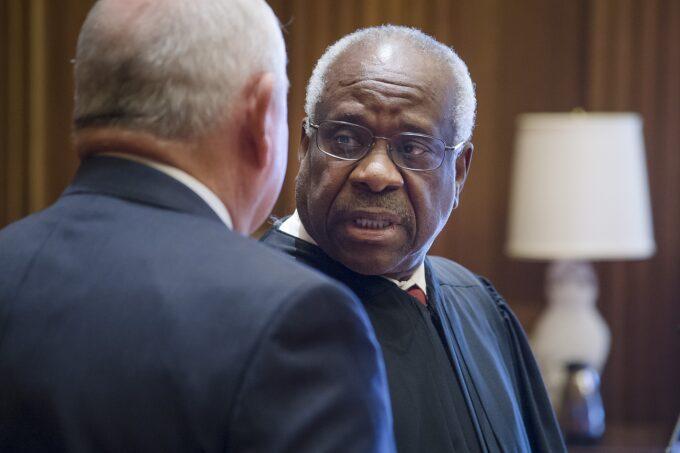
Photograph Source: U.S. Department of Agriculture – Public Domain
Prague.
Clarence and Ginni (Virginia). He, a controversial Associate Justice of the U.S. Supreme Court. She, an extreme right wing activist organizing the Stop the Steal Rally/Coup attempt and actively trying to overturn the 2020 Presidential election results in multiple states. They are extremely close and devoted to each other. They claim not to mix their professional lives but skepticism abounds, and for good reason.
He was the lone dissenter in the Court’s February 2021 ruling dismissing baseless MAGA claims of voter fraud and in its January 2021 ruling allowing the National Archives to release to the January 6 committee Trump White House documents, rejecting monarchical claims of executive privilege. Ethics 101: you don’t rule on cases which concern your family. Given his wife’s active role in promoting voter fraud claims and in the January 6 coup attempt being investigated by Congress he obviously should not have ruled in these cases. His outlier views in them affirm his lack of impartiality and further tarnish the Court.
The degradation of the once revered Court is not new (recall Antonin Scalia’s refusal to heed calls to recuse himself from ruling in Bush v. Gore because his son was part of the Bush legal team, snarkily saying – those who think my vote can be bought so cheaply greatly underestimate me), but the extreme circumstances of the Thomas affair underscore the need to act quickly to update judicial recusal standards and the Court itself.
A judge should recuse herself (step aside and not rule on a case before her) if there is an actual or apparent conflict of any sort. U.S.C. Title 28 Sec. 455 states that a judge must recuse herself whenever her “impartiality might reasonably be questioned.” The rule is aimed at preventing actual injustice and the erosion of public confidence in judicial impartiality. Clarence Thomas has refused to recuse himself in the face of public calls to do so in many cases in which he has an apparent conflict of interest. These include the cases which came before the Court alleging voter fraud in the 2020 election and cases concerning the events of January 6 and Congress investigating those events.
Ethics standards for the Supreme Court are slack, weaker than for other judges, and calls have been made for sensible and practical reforms. As the revelations in the Thomas affair make clear, the need for such reforms is urgent. Those sitting on the highest court must be bound by a code of conduct tailored to the circumstances of their unique position of power. Recusal standards for the Court must be changed from a voluntary subjective standard to a transparent process subject to review and oversight.
Sandra O’Connor, long the center of the Court, cautioned the Court against acting in an unseemly manner, by which she meant acting in ways which went against public opinion or could be seen as partisan. The Bush v. Gore and then the Citizens United v FEC ruling showed how far the Court had lost sight of her warning. And then came the blatant hypocrisy when Mitch McConnell stole the seat of Merrick Garland for Neil Gorsuch and then violated the rationale for that theft when he hastily installed Amy Coney Barrett just before an election. The politicization of the Court with the Federalist Society vetting its members has created a skewed Court with a tenuous- at-best connection to the values of the people. The stature of the Court in the public eye has plummeted (https://news.gallup.com/poll/394103/confidence-supreme-court-sinks-historic-low.aspx), and understandably so.
In the face of the evident corruption of the Court, President Biden’s Supreme Court commission was tasked with exploring options moving forward. It rejected expanding the Court and endorsed some modest term limit proposals, disappointing most observers.
With executive branch power running rampant and public opinion of Congress at an all time low, the Court must find its way back to being the ultimate protector of equality, fairness and decency. There are many viable proposals to this end in the near and long term. We need to make these proposals a vital part of the discourse in upcoming elections. The violation of the establishment clause, as the separation of church and state has been greatly eroded, should also be an important part of our elections as said erosion fuels MAGA and judicial reactionary law and politics. See e.g. Carson v. Makin, the Court’s June ruling mandating that Maine provide public money for religious schools.
The Fallen Court went too far in its Dobbs v. Jackson Women’s Health Organization ruling this June, prompting a burgeoning political backlash at the polls (In Dobbs, Clarence Thomas made clear that in addition to abortion, he wants to go after contraception and same sex marriage). An insufficient number of people want to live in a society in which the Corporation, gun manufacturers and the fetus have more rights than the people, making the Federalist Society hijacking of the Court unsustainable. And an insufficient number of people will tolerate a former President, who is a traitor to his country–stashing top secret classified documents in his personal desk drawer (along with his passports) apparently to sell them to his autocrat role models in Russia and Saudi Arabia – remaining in the public sphere. The times they are a changin’…if we keep the pressure on in our struggle for justice.